
-
Hitta rätt mat för ditt husdjurGör det här testet för att se vilket foder som kan vara bäst för din pälskling.Hitta rätt mat för ditt husdjurGör det här testet för att se vilket foder som kan vara bäst för din pälskling.Utvalda produkter
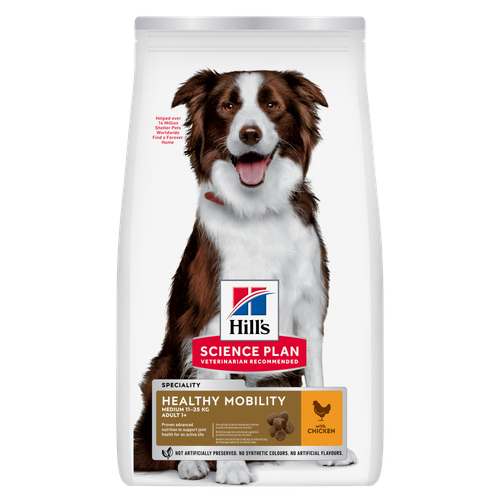 Healthy Mobility Medium Adult Hundfoder
Healthy Mobility Medium Adult HundfoderHill's Science Plan Healthy Mobility Medium Breed Adult Hundfoder med kyckling erbjuder en avancerad nutrition för att stödja ledhälsa och förbättra rörligheten. provides advanced nutrition to support joint health and improve mobility.
Handla nu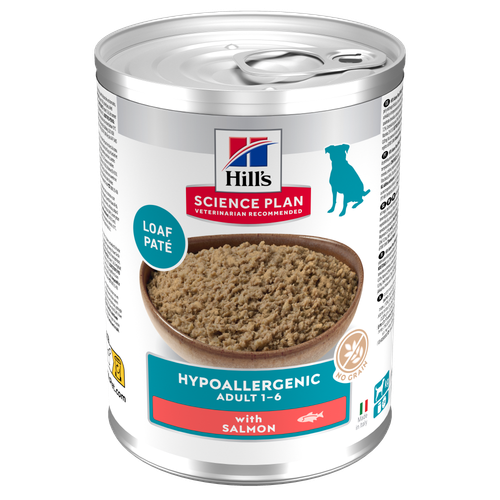 Hypoallergenic Adult Hundfoder
Hypoallergenic Adult HundfoderHill's Science Plan Hypoallergenic Adult våtfoder med lax är ett komplett helfoder av högsta kvalitet för alla vuxna hundar från 1 år och uppåt. Detta läckra våtfoder i burk är speciellt sammansatt för hundar med känslig hud och mage. Den innehåller en enda animalisk proteinkälla och är spannmålsfri.
Handla nu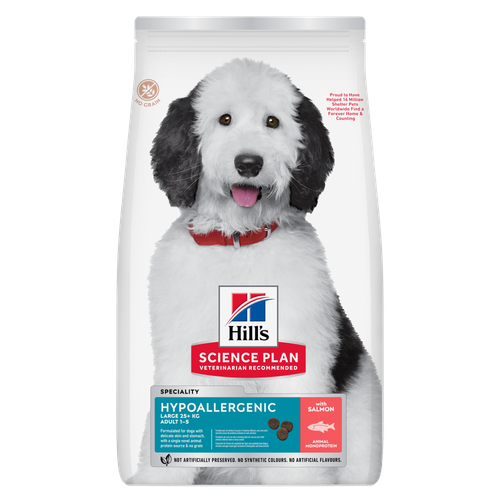 Hypoallergeniskt hundfoder för vuxna hundar med lax
Hypoallergeniskt hundfoder för vuxna hundar med laxHILL'S SCIENCE PLAN Hypoallergenic Large Breed Adult hundfoder med lax är ett komplett foder för vuxna hundar av stora raser i åldern 1–5 år. Det är särskilt framtaget för hundar med känslig hud och mage, med begränsade mängder högkvalitativa och nya proteinkällor samt utan spannmål.
Handla nuHälsotillståndUtvalda produkter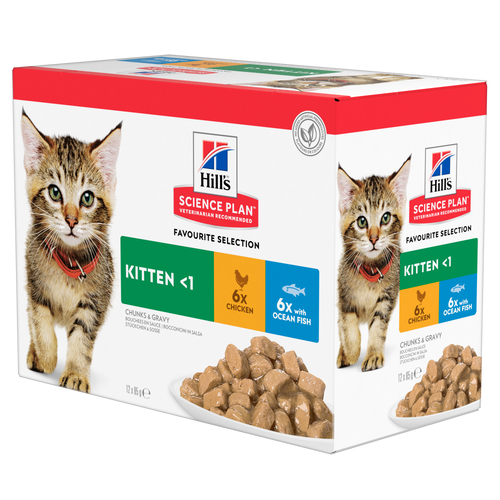 Hill's Sceince Plan Feline Kitten kyckling med havsfisk
Hill's Sceince Plan Feline Kitten kyckling med havsfiskMjuka bitar i sås för kattungar, med omega-3 för hälsosam ögon- och hjärnutveckling och högkvalitativt protein för att stödja muskeltillväxt. Med balanserade mineraler för att främja starkt skelett och starka tänder.
Handla nu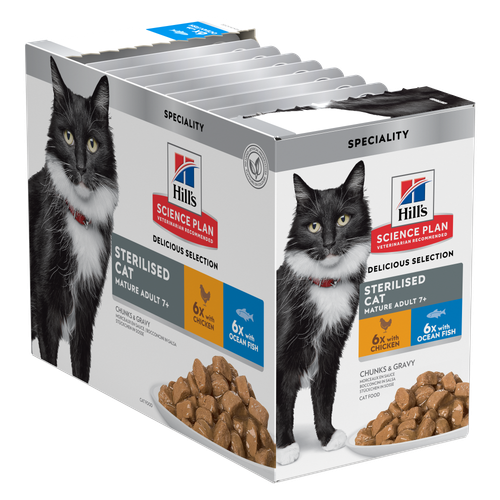 med Kyckling, med Havsfisk
med Kyckling, med HavsfiskHill's Science Plan Sterilised Cat Mature Adult våtfoder med havsfisk är ett komplett helfoder för steriliserade katter över sju år.
Handla nu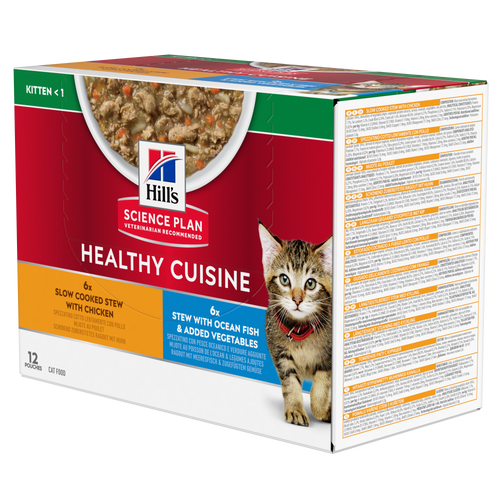 Hill's Science Plan Healthy Cuisine Kattungefoder Kyckling & Havsfisk
Hill's Science Plan Healthy Cuisine Kattungefoder Kyckling & HavsfiskScience Plan Healthy Cuisine stews är 100% balanserad och hälsosamt våtfoder, med oemotståndlig smak som kattungar älskar.
Handla nu -
Till hundägare
- Tips och artiklar
-
Hälsokategori
- Vikthantering
- Miljö- och foderöverkänslighet
- Urinvägar
- Matsmältning
- Leder
- Njurar
-
Hundens livsstadium
- Näring för valpar
- Näring för vuxna katter
- Näring för seniorer
Till kattägare- Tips och artiklar
-
Hälsokategori
- Vikthantering
- Hud- & foderöverkänslighet
- Urinvägar
- Matsmältning
- Njurar
-
Kattens livsstadium
- Näring för kattungar
- Näring för vuxna
- Näring för seniorer
Utvalda artiklar Viktförändringar hos hundar och katter - kan det vara ett sköldkörtelproblem?
Viktförändringar hos hundar och katter - kan det vara ett sköldkörtelproblem?En viktförändring kan tyda på ett problem med sköldkörteln. Läs mer om tecken, orsaker och vad du kan göra åt det.
Läs mer Virtual Vet Visits: What You Need to Know
Virtual Vet Visits: What You Need to KnowLearn the ins and outs of a televet appointment before you talk to a vet online.
Läs mer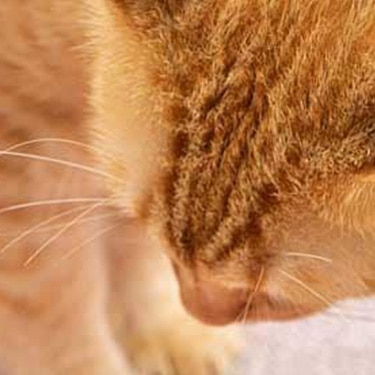 Kristaller och stenar i hund- och katturin
Kristaller och stenar i hund- och katturinLäs om orsaker till och behandlingar av kristaller i hund- och katturin för att bibehålla hundens eller kattens hälsa. För expertråd om urinvård, besök Hill's Pet Sverige.
Läs mer -


Like you, cats need a healthy food and balanced nutrition at every stage of life to thrive, but you can't just serve her a salad for dinner and call it a night. Healthy cat food options promote and enhance a kitten's growth well into adulthood. She needs to stick to a nutrient-rich food for proper development. Here's what you need to know to find the healthiest cat food for her.
Protein, Carbs, and Fat
The healthiest cat food options are those that contain the required nutrients for balanced nutrition. In addition to clean, fresh water, a cat's regular nutritional requirements for healthy living include balanced nutrition including nutrients like protein, carbs and fat - which help keep your cat's muscles, skin and coat healthy. Carbs are important to provide energy, allowing a cat to function at peak performance for extended periods of time.


Smakrika tips
Kattungar kan behöva flera besök under sitt första år för vaccinationer. Vuxna katter har i allmänhet nytta av årliga kontroller, medan seniorkatter eller katter med särskilda behov kan behöva mer frekventa besök.
The Usual Suspects
When you begin your search for a food that benefits your feline friend, you typically see the following ingredients listed on each label:
- Chicken, barley, turkey, tuna, corn and dried egg product are excellent sources of protein.
- Fish oil and soybean oil. Fats are essential in a healthy cat food, especially when storing energy.
- Ground whole grain corn. Carbs that give your furry friend the energy she needs to prance around the house after you've gone to bed.
- Omega 3 and 6 fatty acids. Found in fish oil, eggs, and flaxseed, these fats will give her a gorgeous coat of fur and smooth underlying skin.
- Calcium. This nutrient gives your cat strong, healthy bones and muscle.
- Vitamin E and C. Both of these vitamins protect your cat's cells while keeping her immune system in tiptop shape.
What to Look For
Be sure to familiarize yourself with the way cat food products are labeled. Just as it is with human food product labels, making sense of pet food labels may be confusing at first.
You'll want to pay attention to the phrasing of cat food labels. When food is advertised with one ingredient like "chicken," "tuna," "beef," or the like, the food must contain 95% of that meat per the Association of American Feed Control Officials (AAFCO) guidelines explains by PetMD. Other labels will have a modifier "dinner" or "buffet", which means the meat ingredient must be at least 25%, but not more than 95% of the total weight of all the ingredients, excluding water used in processing. And any phrasing that includes the word "with", such as "with chicken," is only required to include 3% of that ingredient.
In order for a cat food to be considered accurately labeled in the US, for example, it should first adhere to a certain set of criteria determined for each state by AAFCO, which assembles volunteers from government agencies to create guidelines for pet food labeling. This group is also in charge of regulating these rules. You can look to your region's regulatory bodies to find more information about label and packaging guidelines to help you sift through your cat food options.
Another thing to keep in mind is that even the most clinical terms are easy to learn and are perfectly common to cat food. This is where AAFCO comes in again, identifying exactly what's in pet food and explaining what the unfamiliar terms mean. Taurine, for example, sounds very chemical in nature. But it's actually an amino acid found in animal-based protein sources and is essential to a cat's vision, brain, and heart function.
Age and Condition
Armed with information about what's healthy for your kitty and why, you're still faced with an important task: which food to choose.
Before shopping for healthy cat food, speak to your veterinarian to ensure you keep several things in mind, starting with age–kitten vs. adult, for example. Remember that kittens specifically need a kitten food as they need certain levels of nutrients to help them grow up healthy and strong. Cat food designated for adults may not contain the nutrients that are most essential to a growing kitten. As cats age their metabolism slows, much like humans, so the amount of nutrients and calories that help a kitten grow can cause weight issues in older cats. Cat foods like Hill's® Science Diet® are specially formulated to meet the needs of your cat throughout her different life stages. You'll still want to speak with the vet about food that assists her with a specific health issue, such as digestive problems, hairball troubles, or weight control. This includes her level (or lack) of physical activity.
Organic and Natural Options
If you're interested in going the organic food route, it's important to know the differences in product labeling. For example, a product labeled as "organic" must contain one hundred percent certified organic ingredients and the "processing aids" need to be organic as well, while the labeling term "made with organic" requires only seventy percent of the ingredients to be organic. As outlined in the USDA organic regulations, there are additional criteria for the labeling terms, such as how companies must identify these organic ingredients on the label. And keep in mind that, as research-based evidence shows, there is no nutritional benefit to organic ingredients.
The label "natural," according to the USDA's definition, means the food product has been processed, but it hasn't been fundamentally altered: Natural food products don't contain artificial ingredients. If natural cat foods appeal to you, you'll find a variety of products that omit what you don't want in your furry friend's meal, including artificial colors, flavorings, and preservatives.
As with any nutritional change, you'll want to gradually introduce your cat to her new food (usually over 7 days), especially if she tends to be a finicky eater, as many cats are. It takes a little time and research to determine the healthiest cat food for your cat, but making informed choices will help to keep your smallest family member on the right path toward wellness and longevity.


Christine O'Brien är författare, mamma och mångårig kattägare vars två Russian Blues styr hemmet. Hennes arbete finns även på Care.com, What to Expect och Fit Pregnancy, där hon skriver om husdjur, graviditet och familjeliv. Hitta och följ henne på Instagram och Twitter @brovelliobrien.
Relaterade produkter
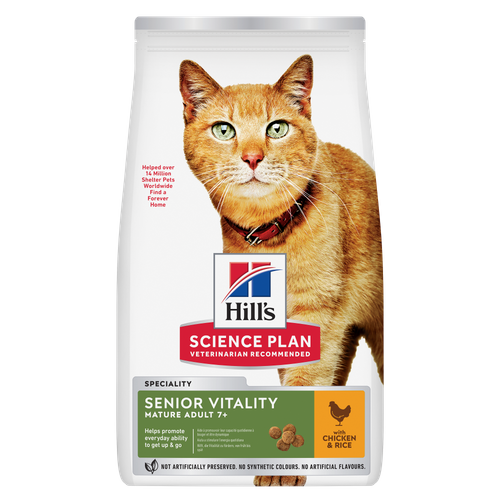
Hill's Science Plan Senior Vitality Kattfoder med Kyckling & Ris erbjuder en noggrant balanserad nutrition som hjälper till att främja deras dagliga förmåga att komma upp och röra på sig.
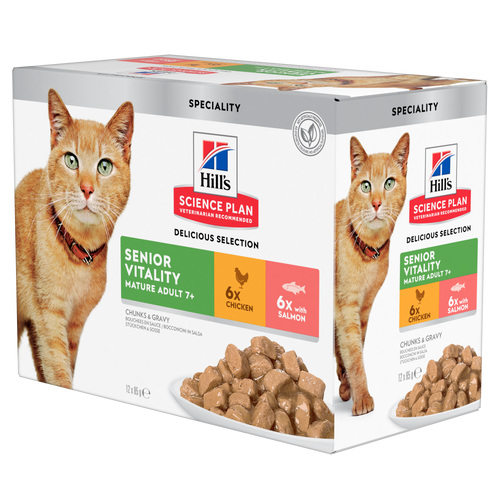
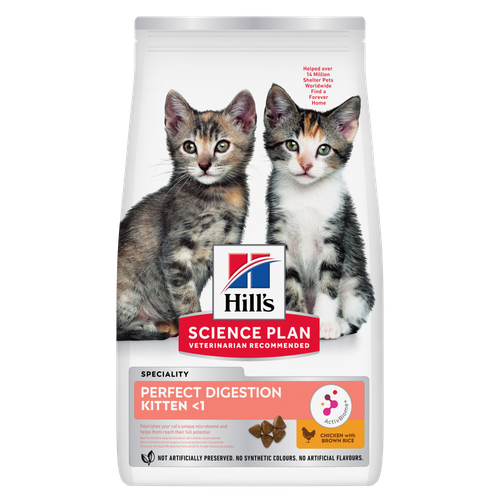
Hill's Science Plan Perfect Digestion Foder till Kattungar med Kyckling & Fullkornsris ger näring åt din kattunges unika mikrobiom och hjälper dem att nå sin fulla potential.
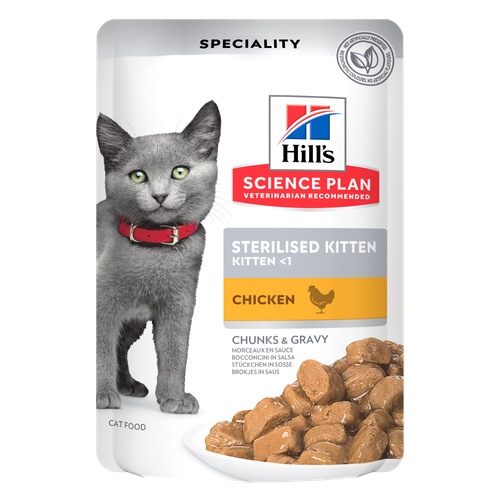
Hill's SCIENCE PLAN Sterilised Kitten kattungefoder är skapat med Hill´s unika förståelse för de specifika behov som kastrerade kattungar har. Det bidrar med hög proteinkvalitet för muskelutveckling, med kontrollerat fett för att förebygga risk för övervikt efter kastrering. Dessutom har det en unik blandning av antioxidanter för att främja ett hälsosamt immunsystem för att stöjda din kattunges tillväxt.
Relaterade artiklar
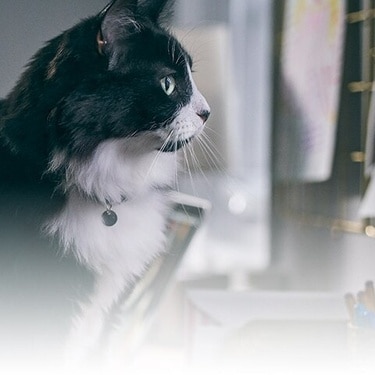
Lär dig mer om orsakerna till hårbollar hos katter och upptäck effektiva behandlingar för att hålla din katt frisk. Besök Hill's Pet Sverige för fler råd om katters hälsa.

Upptäck roliga och engagerande spel för katter som även fungerar som bra motionskällor. Utforska spännande sätt att hålla din katt aktiv och underhållen!

Discover how to train your cat, starting with very basic first steps that both reward good behavior and discourage the bad. It
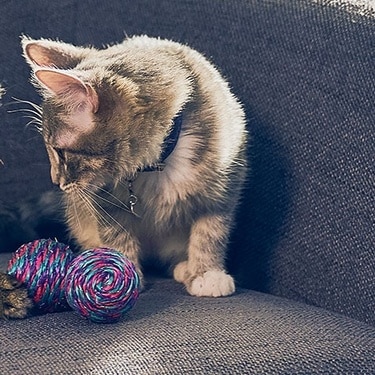
Are you looking to get your cat more active? Does she constantly look bored? Then you may want to consider using a food-dispensing (also known as treat-dispensing) cat toy, which provides both physical and mental stimulation during snack times.

Sätt din katt på diet utan att den märker det
Vår kalorifattiga sammansättning hjälper dig att kontrollera din katts vikt. Den innehåller högkvalitativt protein för att bygga slanka muskler och är tillverkad med noga utvalda ingredienser för en smakrik och näringsrik måltid. Kliniskt bevisade antioxidanter, vitamin C+E, bidrar till ett friskt immunförsvar.
Sätt din katt på diet utan att den märker det
Vår kalorifattiga sammansättning hjälper dig att kontrollera din katts vikt. Den innehåller högkvalitativt protein för att bygga slanka muskler och är tillverkad med noga utvalda ingredienser för en smakrik och näringsrik måltid. Kliniskt bevisade antioxidanter, vitamin C+E, bidrar till ett friskt immunförsvar.

